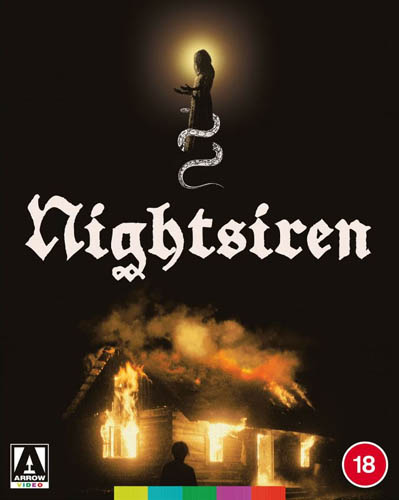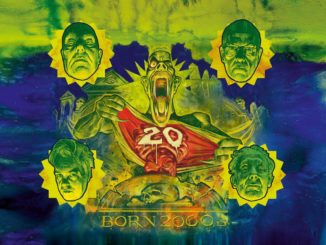Nightsiren, Svetlonoc (2022)
Directed by: Tereza Nvotová
Written by: Barbora Namerova, Tereza Nvotová
Starring: Eva Mores, Iva Bittová, Jana Olhová, Juliana Olhová, Marek Geisberg, Natalia Germani, Zuzana Konecná

NIGHTSIREN (2022)
Directed by Tereza Nvotová
Slovak language with English subtitles
Available on Arrow Video limited edition Blu-Ray
A young woman named Sarlota returns to the mountain village she grew up in after receiving an official letter about her mother’s estate but is given a frosty reception by the locals. Staying in the abandoned cottage that once belonged to ‘witch’ Otyla, Sarlota’s presence is more unwelcome the longer she stays. Fortunately, she finds a kindred spirit in the feisty Mira, another young woman who’s staying in the village who is seen as free-spirited amongst the neighbours. As Sarlota tries to make sense of the troubled childhood she left behind and the events that have transpired in her absence, she comes to face to face with a horrible realisation that the community she once called her home has not progressed in the same way as the rest of the society.
Having been nominated for numerous awards and having secured three wins at Sitges and one at Locarno International Film Festival, folk horror drama NIGHTSIREN is a curious piece of storytelling that starts on shaky legs before dusting itself off and standing proudly on its own two feet.
A shocker of an opener sets the scene and is often revisited as Natalia Germani’s Sarlota returns to the village that holds a lot of painful memories for her. After finding her mother’s cabin burned down, she tries to get answers from the locals about the circumstances of the charred remains of the property, and the fate of her mother and late sister. She’s unable to rally much of a response, however, and the first half of the movie we see her struggle to fit in within a community whose values are very traditional and whose views are somewhat stuck in the past.
Despite the film being set in modern times, husbands beat their wives and their children, the womenfolk fear witches, evil spells and omens – all of which plays out in the mountain community where Sarlota finds herself. Disjointed scenes stitch together a picture of unease, grief and torment. Although it’s sometimes hard to decipher what’s going on as the story meanders from the grim reality to something more surreal, involving the presence of a lone wolf or pack of wolves, the root of the story remains steadfast. This troubled woman finds herself alone in the world, but meeting Mira (Eva Mores) changes her stance and stay in the village. Finding her naked, moonbathing on the grass outside the cabin, Sarlota is at first taken aback by the strange woman but soon lets down her guard, discovering that Mira is the only person she can truly talk to.
Halfway through the film, tension begins to mount as Sarlota increasingly comes head-to-head with the neighbours. They’re convinced she’s wicked, responsible for turning the freshly killed goose rotten, amongst other things. Their disagreements and fear of Sarlota and her family have tainted their view and the highly superstitious locals are unable to move past this view of her. Things only worsen with the addition of Mira in tow, whose promiscuity has the local men thinking they can take advantage of her whenever they see fit, seeing her as a whore they can enjoy or slag off when the moment suits.
NIGHTSIREN deals with a lot of pent up emotion and does so in a fascinating way. It blurs the line between reality and fantasy, teasing pagan elements which leave you wondering whether or not there is credence to the villagers’ concerns. The contrast of the modern young women (Sarlota and Mira) and the villagers, who are stuck in their ways and traditions, is where the real fear and threatening behaviour truly manifests.
A community that has not evolved with the times but has clinged on to the old ways in such a fashion it has left the women folk consumed by fear in their patriarchal society. Their frustrations from their ill-treatment is directed in a way as to blame the other women of witchcraft rather than acknowledge the real harm being done to them in their own homes. This ideology of their wives suits the men of the village who feel threatened by the independent women they suddenly find in their midst, possibly concerned that their independence might be infectious and turn their own womenfolk against them. When the men don’t get their own way and their nose is pushed out of joint by the assertive ladies, the young women find themselves with a target on their back. When danger and threats arise, the finger automatically points to those that have dared to be different, who represent everything the community is not, for they must be the work of the wicked.
The setting of the mountain community makes the perfect backdrop for this folk mystery drama, as the isolation really preys upon the lead character Sarlota and the demons that have been eating her up all these years. Whilst the story feels patchworked together at times, the core shines through and it’s the latter half of the movie where the characters and the plot truly develop, turning the film on its head from its original story. Most questions lingering over the head of the lead character are explained and the culmination of the film ends up being a frightful, action-packed episode that will have you on the edge of your seat, especially considering the majority of the film is a dramatic, melancholic movie.
If you enjoyed Robert Eggers’ The Witch and other psychological folk horrors of its ilk, then this Slovakian tale of grief, guilt and repentance in the face of hardened adversity may certainly pique your interest.







Be the first to comment